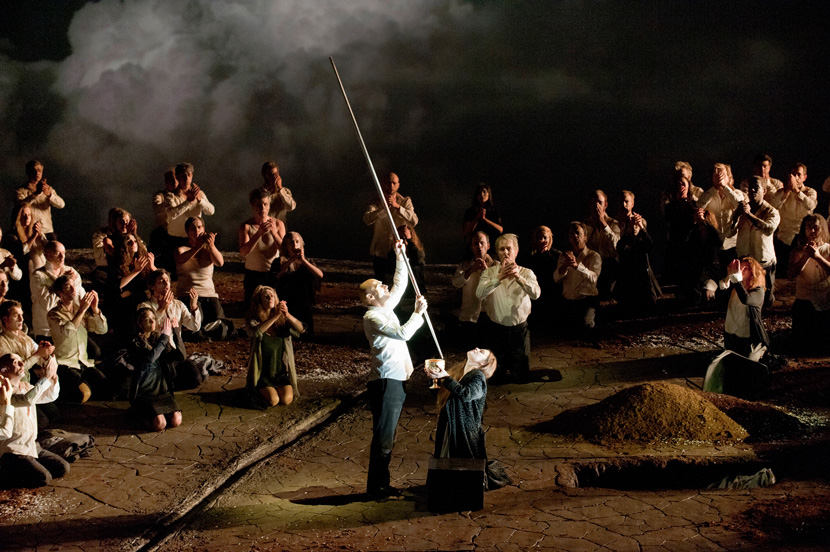
Elena Zhidkova as Kundry and Nikolai Schukoff as the title character in the Opera de Lyon's 2012 production of Richard Wagner's Parsifal. Photo by Philippe Merle/AFP/Getty Images.
...In perceiving Judaism to stand ineradicably opposed to his own redemptive project, Wagner in fact perceived rightly.
... in Parsifal, Wagner’s final opera, ...we encounter Kundry, the one character in all of his operas who is explicitly Jewish. Kundry is the archetypal Jew of medieval legend, the wandering Jew Ahasuerus, cursed to roam the world eternally for mocking Christ on the cross. To music of an inexpressible weariness, she confesses: “I saw Him—Him—and laughed!” For this sin of laughter she is damned to wander “from world to world,” seeking a redemption that always eludes her. Like the Jews of Das Judentum in Musik [Wagner's notorious and disgusting antisemitic pamphlet], she longs for community but remains forever outside it. Desperate for salvation, she is cursed by her sensuality, her worldliness, to be nothing but a source of corruption. When her salvation does at last arrive, in the grand reconciliation of Parsifal’s third act, it is followed immediately by, or is consummated in, her death. As the holy grail casts its healing light over the assembled congregation, Kundry falls to the ground, thus seeming to fulfill perfectly Wagner’s chilling interdiction at the end of Das Judentum in Musik: “one thing only can redeem you [Jews] from the burden of your curse: the redemption of Ahasuerus—Going under!”
With this, something striking about Wagner’s anti-Semitism comes into focus ...not merely a compulsive racial prejudice but a crucial intellectual and moral tool. Through the adversary symbol of the Jew, Wagner sought to make sense of the world and of mankind’s place in it: this much he has in common with such anti-Jewish predecessors as Martin Luther.
But what is frightful about Wagner, what separates him entirely from Luther, is that in perceiving Judaism to stand ineradicably opposed to his own redemptive project, he perceived rightly....
*Nathan Shields is a composer whose works have been performed by numerous vocalists and chamber-music groups. He earned his doctorate at the Juilliard School in New York, and teaches there and at the Brooklyn Institute for Social Research. He is the recipient of the 2014 Charles Ives fellowship from the American Academy of Arts and Letters.

No comments:
Post a Comment